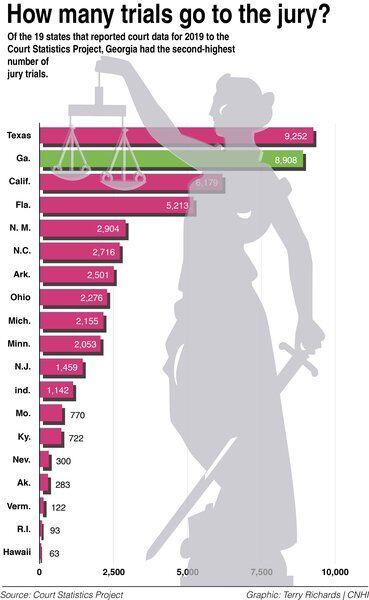Court trials stalled: Wheels of justice turn slow in pandemic
Published 7:00 am Saturday, February 13, 2021

- Terry Richards | CNHI
VALDOSTA — Georgia’s judiciary remains stalled as the COVID-19 pandemic continues, with the Southern District Attorney saying his office has a backlog of hundreds of cases.
On Feb. 7, state Supreme Court Chief Justice Harold Melton issued another 30-day extension of an emergency order he issued March 14, 2020, suspending jury trials.
In October, Melton lifted the ban on jury trials, only to re-impose it in December because of a rapid rise in the number of COVID-19 cases.
Lowndes County never restarted jury trials during the brief window in late 2020, said Beth Greene, Lowndes County clerk of courts.
“We decided to take a look at what was happening in other counties and decided not to,” she said. That means there hasn’t been a state trial in Lowndes County for almost a year.
Aside from jury trials, all court functions are up and running, albeit not always in the traditional show-up-at-the-courthouse manner, she said. Many functions are being carried out by video.
Grand jury operations have resumed, in part because they are carried out on a smaller scale than jury trials, Greene said. Grand juries determine whether there is sufficient evidence in a case to warrant a full criminal trial.
“In a jury trial, we can have 100 people present,” she said. “We can’t keep them separated.”
The lack of jury trials has forced some changes to the way the district attorney’s office operates, said Southern District Attorney Brad Shealy, whose represents Lowndes, Thomas, Colquitt, Brooks and Echols counties.
His office has more than 800 trial cases backed up, he said.
“We can’t just indict everyone with a grand jury because there are no jury trials” for fear of overcrowding jails, he said.
While some cases must go before a grand jury, other cases have been handled through guilty pleas, Shealey said. There has been more plea bargaining than usual, he said.
“Some people with lesser charges, such as drug violations, have gotten better plea deals than normal,” Shealy said, though he emphasized that hasn’t been the case with serious crimes such as murder.
Some defendants, though, won’t consider a plea deal until they’re sitting in the same courtroom as a jury ready to try them, he said.
“Until then, there’s no incentive for them to bite the bullet and plead guilty,” Shealy said.
When jury trials do resume, “it’s not going to be a pretty sight,” the district attorney said.
Greene said there had been hopes of restarting trials in March, but the courts are looking at the situation month to month.
“We have 18 weeks of trials in a normal year,” Shealy said. “It’s like being on a beach and seeing a tsunami 100 miles out to sea: there’s not much you can do but try to get ready for it.”
Terry Richards is senior reporter at The Valdosta Daily Times.


